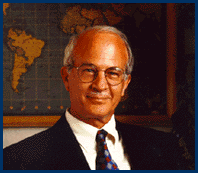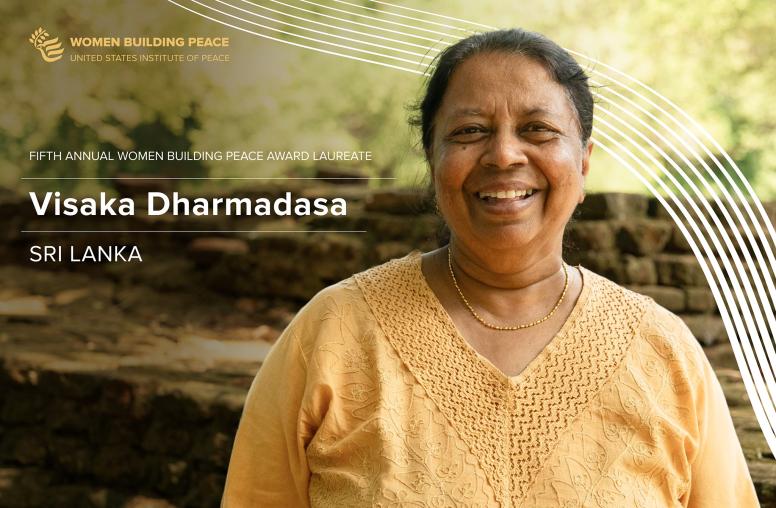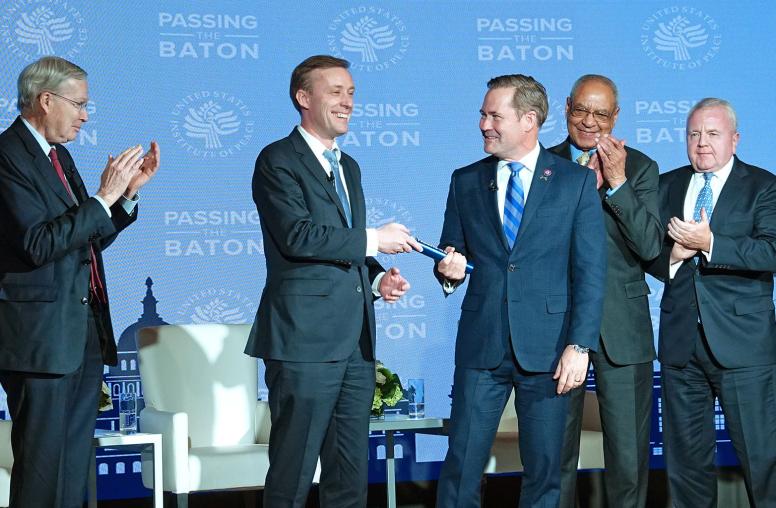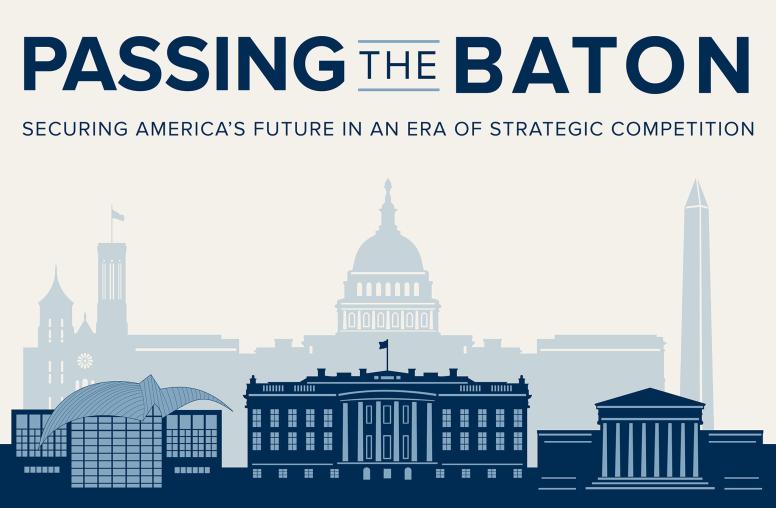Peace on Earth the Other 364 Days
Comments by Institute Board Chairman Chester A. Crocker.
Image on left: Chester A. Crocker USIP Board Chairman
 There is a profound contradiction in the American way of dealing with the world. Our society and economy, our communication and travel patterns, and even our personal investment choices are increasingly global. In our corporate, cultural and recreational lives we are engaged internationally and becoming more so. Yet we have fallen behind year after year in our investments in international education and research, in funding the basic foreign affairs agencies of the federal government, and in supporting those policies (such as "fast track" trade authority) and institutions (such as the U.N. and the IMF) that extend our reach and bolster U.S. leadership. To these ironies we should add that unique blend of unilateralism, sermonizing and hubris that characterizes much of U.S. discourse on foreign affairs today. As former Defense Secretary James Schlesinger noted recently in the National Interest, "we are given to the exuberant enjoyment ... of our own exceptionalism ... It is our little conceit that once other nations have learned how we feel, they will mend their ways."
There is a profound contradiction in the American way of dealing with the world. Our society and economy, our communication and travel patterns, and even our personal investment choices are increasingly global. In our corporate, cultural and recreational lives we are engaged internationally and becoming more so. Yet we have fallen behind year after year in our investments in international education and research, in funding the basic foreign affairs agencies of the federal government, and in supporting those policies (such as "fast track" trade authority) and institutions (such as the U.N. and the IMF) that extend our reach and bolster U.S. leadership. To these ironies we should add that unique blend of unilateralism, sermonizing and hubris that characterizes much of U.S. discourse on foreign affairs today. As former Defense Secretary James Schlesinger noted recently in the National Interest, "we are given to the exuberant enjoyment ... of our own exceptionalism ... It is our little conceit that once other nations have learned how we feel, they will mend their ways."
In reality, we have much to learn about a changing world and about how we can most effectively and honorably advance U.S. interests and values in it. The post Soviet geopolitical shift as well as economic globalization (and the growing backlash against it) and the exponential impact of the information technology revolution all make it imperative that the U.S. adapt the way it conducts its inescapable global leadership role. Perhaps the most critical arena for such leadership remains the challenge of working for peace and security in this age of worldwide systemic transformation. In this regard, it is interesting to reflect on a little-known federal institution, the U.S. Institute of Peace, whose programs are pushing the conceptual and technological envelope, giving our leaders the potential to digest what we have learned about conflict and peacemaking and use it on the problems of today's world.
The institute came into being 13 years ago in bipartisan legislation, signed by President Reagan, to establish a "living institution" symbolizing and strengthening "the fruitful relation between the world of learning and the world of public affairs" (to quote the statute). Its purpose: to develop "a range of effective options, in addition to armed capacity, that can leash international violence and manage international conflict."
There were many skeptics. For years, partisan battles had been waged in the name of "peace," a term burdened with ugly corruption by the Soviets who shamelessly manipulated "peace" groups and other front organizations during the Cold War in an effort to undermine U.S. and allied resistance to communist expansion. Moreover, hackles were raised among some moderates and conservatives by the prospect of institutionalizing advocacy for what they viewed as values relativism and touchy-feely policy instincts of peace activists and conflict resolution specialists.
But the Institute of Peace has confounded the early skeptics. A bipartisan board, appointed by the president and confirmed by the Senate, ensures that its programs and policies are nonpartisan and do not become captive of any narrow constituency or special interest. The institute takes seriously its congressional charter "to serve the people and the government."
Currently funded at about $11 million a year, with a small staff working out of rented office space, this modest agency is becoming a significant national resource. It is the only federal institution dedicated to research, analysis, policy studies, education and training about the arts of making peace and preventing and managing international conflict short of having to send in troops.
This innovative outfit is more relevant to today's foreign policy and security challenges than even its founders could have imagined. Post-Cold War hopes for an era of tranquillity were quickly dashed as unanticipated forms of conflict and human suffering have erupted on a global scale. While interstate war is rare today, civil strife with ethnic and religious roots is thriving. At times, such violence spills over into areas of previously settled disputes, so that internal wars rapidly acquire regional or international importance. In addition, we cannot be certain that the era of state-to-state conflict over regional leadership and control of key resources is gone forever.
These trends put severe pressure on shrinking U.S. defense and foreign policy resources and our finite diplomatic energy and capital. If we are to sustain America's international leadership role (as key leaders in both parties correctly insist we should), we need a creative, innovative and resourceful diplomacy. We need options between doing nothing (as Secretary of State Madeleine Albright acknowledged happened in 1994 in Rwanda) and sending in the Marines. We need the widest possible range of tools for projecting abroad our influence for peace and security: expanded knowledge of nonviolent approaches for dealing with conflict; systematic study of lessons learned from all forms of third-party intervention techniques (military, political, economic, diplomatic, official, multilateral and nongovernmental); and a more rigorous database about what works, why and when, in the negotiation and the implementation of peace accords. We need, in sum, to move away from the simplistic policy inventory of the past to become more of a "full service bank" with a wide array of policy initiatives and responses tailored to an increasingly complex and often chaotic world.
These are precisely the things the Institute of Peace does. Its support for basic research has developed an invaluable body of knowledge about the sources of conflict in today's world. This knowledge is "applied" and made available to practitioners in the departments of State and Defense, the uniformed military and the National Security Council through cooperative programs, study groups and workshops. Its nonpartisan, federal status gives the institute a unique convening capacity to mobilize the best talent available worldwide and bridge the worlds of analysis and action. Targeted training programs enable the institute to support U.S. civilian and military professionals coping with hot spots around the world. Foreign and multilateral agencies and regional security bodies seek institute training and advisory input.
The institute and its people have been called upon to help facilitate negotiated resolution of disputes in such places as Cyprus, Kashmir, Sudan and Western Sahara. Institute scholars and visiting fellows are an important national resource on trouble spots in Africa, the Persian Gulf and Middle East, the Korean peninsula and Northern Ireland. Specialized institute programs on transitional justice help South Africans, Bosnians and Rwandans seek justice and reconciliation. Conferences bring together humanitarian organizations, governments and multilateral agencies to explore the necessity of real-time coordination and communication using the latest information technologies. And the institute's education and publication programs bring the fruits of this material to scholars, educators and students across the globe.
Last fall Congress transferred to the institute one of the last building sites on the Mall as a location for a permanent headquarters and a memorial to peace and peacemakers. This 3-acre plot, just across Constitution Avenue from the Vietnam, Korean and Lincoln memorials, will one day be a part of a "war and peace" corner of the Mall in our capital city. This will be a government-private sector partnership, and the institute is now launching a capital campaign to raise funds for the construction of the new facility.
It is increasingly apparent that both the policies and institutions created to serve an earlier age of foreign policy challenges now require adaptation in the interests of sustained and creative U.S. leadership in the world. Here is one national institution that is rising to the challenge.
Chester A. Crocker, a Senior Official in Policymaking for Africa in the 1980s, is a Professor of Diplomacy at Georgetown University.
This article was originally published in the Los Angeles Times on December 25, 1997.



